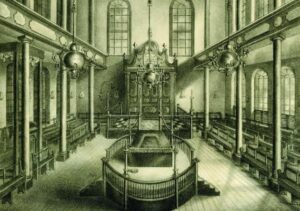| Contribute a translation | Source (English) |
|---|---|
Praise to thee, thou great Creator! Praise to thee from every tongue! Join my soul with every creature, Join the universal song! (Hallelujah) | |
For ten thousand blessings given, For the hopes of future joy, Sound his praise thro’ earth and Heaven, Sound YHVH’s praise on high! (Halelujah!) |
“Universal Praise” appears as Hymn 19 in The Sabbath service and miscellaneous prayers, adopted by the Reformed society of Israelites, founded in Charleston, S.C., November 21, 1825 (1830, Bloch: 1916), p. 64. Gary Zola writes that the prayer was written by David Carvalho for the Society as indicated in Abraham Moïse’s annotated copy of the 1830 prayerbook.[1] Find, “The First Reform Prayerbook in America” (p. 116 ft. 32) in Platforms and prayer books: theological and liturgical perspectives on Reform Judaism (2002) I have replaced the vocalized Tetragramaton in the penultimate line of the second stanza with ‘YHVH.’ I have preserved the wording as handwritten in the endpapers of the Constitution of the Reformed Society of Israelites, 1825. –Aharon Varady
Source(s)


Notes
| 1 | Find, “The First Reform Prayerbook in America” (p. 116 ft. 32) in Platforms and prayer books: theological and liturgical perspectives on Reform Judaism (2002) |
|---|

“Universal Praise, a hymn by David Nunes Carvalho (Reformed Society of Israelites, Charleston, South Carolina, 1826)” is shared through the Open Siddur Project with a Creative Commons Public Domain Dedication 1.0 Universal license.




Leave a Reply